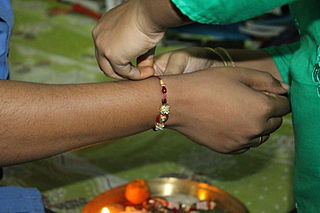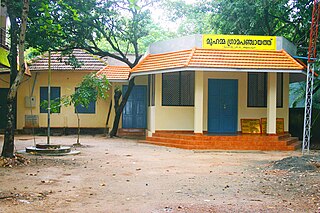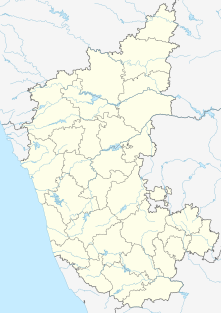Dum Urabinahatti | |
|---|---|
Village | |
| Country | |
| State | Karnataka |
| District | Belagavi |
| Talukas | Gokak |
| Languages | |
| • Official | Kannada |
| Time zone | UTC+5:30 (IST) |
Dum Urabinahatti is a village in Belagavi district in the southern state of Karnataka, India. [1]
Dum Urabinahatti | |
|---|---|
Village | |
| Country | |
| State | Karnataka |
| District | Belagavi |
| Talukas | Gokak |
| Languages | |
| • Official | Kannada |
| Time zone | UTC+5:30 (IST) |
Dum Urabinahatti is a village in Belagavi district in the southern state of Karnataka, India. [1]

Raksha Bandhan, also Rakshabandhan, is a popular, traditionally Hindu, annual rite, or ceremony, which is central to a festival of the same name, celebrated in India, Nepal and other parts of the Indian subcontinent, and among people around the world influenced by Hindu culture. On this day, sisters of all ages tie a talisman, or amulet, called the rakhi, around the wrists of their brothers, symbolically protecting them, receiving a gift in return, and traditionally investing the brothers with a share of the responsibility of their potential care.
A gram panchayat or village panchayat is the only grassroots-level of panchayati raj formalised local self-governance system in India at the village or small-town level, and has a sarpanch as its elected head.
The administrative divisions of India are subnational administrative units of India; they compose a nested hierarchy of country subdivisions.
A sarpanch or pradhan or mukhiya is a decision-maker, elected by the village-level constitutional body of local self-government called the Gram Sabha in India. The sarpanch, together with other elected panchayat members, constitute the gram panchayat. The sarpanch is the focal point of contact between government officers and the village community and retains power for five years.

In India, the Panchayati Raj generally refers to the local self-government of villages in rural India as opposed to urban and suburban municipalities, this system was introduced by a constitutional amendment in 1992. Although it is based upon the historical panchayat system of the Indian subcontinent. The recommendation of LM Singhvi Committee (1986) was accepted. This Panchayati Raj system was formalized in 1992, following a study conducted by a number of Indian committees on various ways of implementing more decentralized administration. The modern Panchayati Raj and its Gram Panchayats are not to be confused with the extra-constitutional Khap Panchayats found in northern India.
Ramapur village and post, or Rama Pur as it is known for postal purposes, is a village-gram panchayat in Pawai Block, Phulpur, Azamgarh, Uttar Pradesh, India comprising five villages located on the Sultanpur-Azamgarh road. A visit to the village by Indira Gandhi in 1982 led to Ramapur becoming the first village in the area to be provided indoor electricity. Oril is original village of Ramapur resident's where "Baba Yogi Sarang Dhar" and "Mata Ji" is still worshiped near "Sacred Banyan Tree" after marriage ceremony by people of Ramapur. "Baba Yogi Sarang Dhar which means the Lord Vishnu/ Krishna /Ram/ Shiva/ Gangadhar-Shiva/ Brahma)" was of Basti district origin whom the five village along with the Oril itself donated by the Muslim Landlord and "Mata Ji" was from Jaunpur district. In connection with this it has internal relationship with Bishunpur, Jaunpur at present time too as a well known proof of relation with Jaunpur.

Belagali is a Pattan panchayat Town in the southern state of Karnataka, India. It is located in the Mudhol taluka of Bagalkot district in Karnataka, about 4 km east of the town of Mahalingpur.

Dhavaleshwar is a village in the southern state of Karnataka, India. It is located in the Mahalingpur taluk of Bagalkot district in Karnataka. Dhavaleshwar is located on the bank of Ghataprabha river. The river bifurcates the Belgaum and Bagalkot districts. Just on the other side of the river, there is one more village which, is also known as Dhavaleshwar. This Dhavaleshwar belongs to Gokak Taluk of Belgaum district. Many politicians promised to build a bridge between both villages, but no one has initiated. The villagers grow sugar cane, which is the source of their income.

Hulagabali is a village in the southern state of Karnataka, India. It is located in the Athani taluk toward north-east of Belgaum district. The basic occupation in Hulagabali is agriculture and there are also many landlords in the village who are famous in agriculture. Sugarcane is the highest percentage of agriculture as per the survey. There are quite a few temples in the village. The Birappa temple located in this village is well known in surrounding villages. Birappa temple has a large fair and festivities twice a year that draws huge crowd in the region. Sri Sangameshwara temple stands at the juncture of River Krishna and River Agrani. The famous landlords are Patil (Gouda).

Mamadapur is a village in the southern state of Karnataka, India. It is located in the Gokak taluk of Belgaum district in Karnataka. It is the birthplace of Wrangler D.C. Pavate

Naganur is a village in the southern state of Karnataka, India. It is located in the Gokak taluk of Belgaum district in Karnataka.

Nidagundi is a village in the southern state of Karnataka, India. It is located in the Raybag taluk of Belgaum district in Karnataka.

Uchagaon (उचगाव) is a village in the southern state of Karnataka, India. It is located in the Belgaum taluk of Belgaum district in Karnataka. Last village on the way towards maharastra.

Yaragatti is a village in the southern state of Karnataka, India. It is located in the Saundatti taluk of Belgaum district in Karnataka.
A tehsil is an administrative division in some countries of the Indian subcontinent that is usually translated to "township". It is a subdivision of the area within a district including the designated city, town, hamlet, or other populated place that serves as its administrative centre, with possible additional towns, and usually a number of villages. The terms in India have replaced earlier geographical terms, such as pargana and thana.

Karajagi is a village in jath, in the state of Maharashtra]], India. It is located in the jath taluk of sangli district.
Ingalagi is a panchayat village in Belgaum district in the southern state of Karnataka, India.

The Panchayat raj (panchayat "village council", raj "rule") is a political system, originating from the Indian subcontinent, found mainly in India, Pakistan, Bangladesh, Sri Lanka, and Nepal. It is the oldest system of local government in the Indian subcontinent, and historical mentions date to the 250 CE period. The word raj means "rule" and panchayat means "assembly" (ayat) of five (panch). Traditionally panchayats consisted of wise and respected elders chosen and accepted by the local community. However, there were varying forms of such assemblies. Traditionally, these assemblies settled disputes between individuals and between villages.
| This article related to a location in Gokak taluk, Belgaum district, Karnataka, India is a stub. You can help Wikipedia by expanding it. |